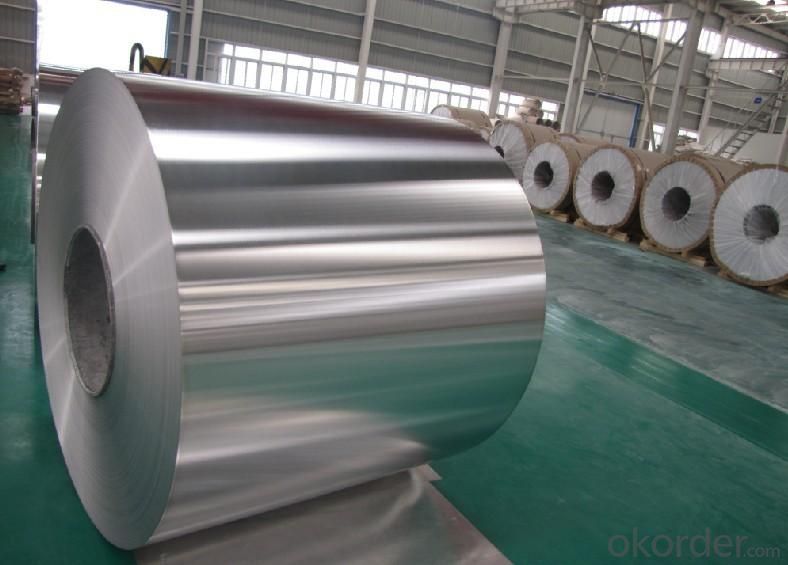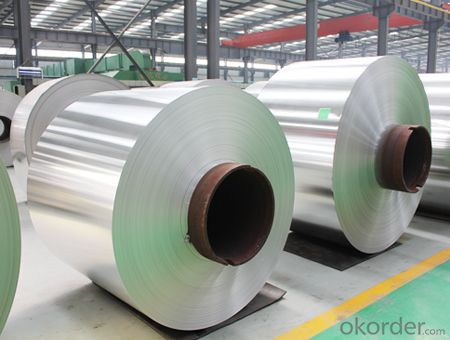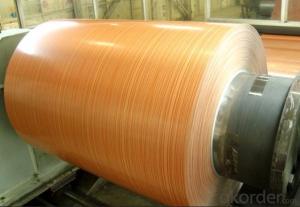Color Coated Aluminum Coil Aluminum Roll Temper H16
- Loading Port:
- Shanghai
- Payment Terms:
- TT or LC
- Min Order Qty:
- 2 m.t.
- Supply Capability:
- 60000 m.t./month
OKorder Service Pledge
OKorder Financial Service
You Might Also Like
Item specifice
Color Coated Aluminum Coil Aluminum Roll Temper H16
1. Grade
| Series: | 1100 etc. |
| Series: | 3003 3004 3005 etc. |
| Series: | 5006, 5052 |
| Series: | 8011 etc. |
2. Thickness
| Plate Thickness | 0.1mm, 0.12mm,0.15mm,0.20mm,0.25mm,0.28mm,0.3mm,0.35mm,0.38mm, 0.4mm,0.5mm, 0.53mm, 0.58mm,0.68mm,0.7omm,0.73mm,0.75mm, 0.90mm, 1mm, 1.2mm |
| Coil Thickness | 0.1mm, 0.12mm,0.15mm,0.20mm,0.25mm,0.28mm,0.3mm,0.35mm,0.38mm, 0.4mm,0.5mm, 0.53mm, 0.58mm,0.68mm,0.7omm,0.73mm,0.75mm, 0.90mm, 1mm, 1.2mm |
3. Description
Alloy | AA1100, 3003, 3004, 3105, 5006, 5052, 8011, etc , etc. |
Temper | H16, H18, H24, H26, H28 |
Thickness | From 0.1mm to 1.2mm |
Width | Standard width:1240mm, 1270MM |
Special width:1000mm, 1200mm, 1240mm, 1270mm, 1520mm, 1620mm | |
Diameter | Standard dia:1200mm |
Interior dia: 150mm,405mm, 500mm, 505mm, 510mm | |
outer diameter: 1200mm | |
Weight | 2.5 T/coil,3.0 T/coil |
Coating thickness | PE:>=16 micron , PVDF:>=25 micron |
Protective film | As per customer’s request |
Coating paint | PVDF, PE(Polyester), epoxy, polyamide, polyurethane |
Color | Soid, metallic, high gloss,stone,timber,brush,mirror,sparkling, RAL or by customer requirements. |
Weight | As per customer’s request |
| Surface | Embossed, mill finish, coated |
| Gloss | 10-100% |
| Coating Hardness (pencil resistance) | More than 2h |
| Coating adhesion | 1J |
| Impact Resistance | No peeling or cracking(50 kg/cm) |
| Application | ACP,wall cladding,facades,roofs and canopies,ceilings,signboards,blind window,display platforms,electrical panels,etc |
| Coating Thickness | PE coating:more than 16 micron |
| PVDF coating:more than 25micron |


4. FAQ
Q: Can you provide free samples?
A: Yes, free samples will be sent to you on freight at destination.
Q: Can I get your latest catalogue?
A: Yes, it will be sent to you in no time.
Q: What is the MOQ?
A: 5 tons
Q: What are your payment terms?
A: We accept L/C, D/A, D/P, T/T, West Union, etc
- Q:Are aluminum coils suitable for decorative applications?
- Yes, aluminum coils are suitable for decorative applications. Aluminum is highly malleable and can be easily shaped into various designs, making it a popular choice for decorative purposes. Additionally, aluminum is resistant to corrosion, lightweight, and has a natural sheen, which adds to its aesthetic appeal. Its versatility, durability, and availability in different colors and finishes make it an excellent material for decorative applications in various industries such as architecture, interior design, and automotive.
- Q:Are aluminum coils fire-resistant?
- Yes, aluminum coils are fire-resistant.
- Q:Are aluminum coils suitable for high-gloss applications?
- High-gloss applications can benefit greatly from the use of aluminum coils. This metal possesses outstanding reflective qualities and, when treated and finished correctly, can achieve a remarkable level of shine and gloss. Its smooth surface and reflective nature work together to enhance the appearance of high-gloss finishes, making it an excellent choice for those seeking a polished and shiny look. Aside from its aesthetic advantages, aluminum also offers several practical benefits for high-gloss applications. It is lightweight, durable, and resistant to corrosion, making it a reliable and low-maintenance option. Moreover, aluminum coils are highly malleable, allowing them to be easily molded into different shapes and sizes, a crucial aspect when aiming for the desired high-gloss design. Moreover, aluminum coils can be coated with various finishes, such as anodized coatings or high-quality paint systems, to further enhance their durability and glossiness. These coatings provide an extra layer of protection against scratches, fading, and other forms of wear and tear, ensuring the long-lasting maintenance of the high-gloss appearance. To summarize, aluminum coils are a perfect choice for high-gloss applications due to their reflective properties, versatility, and durability. With the right treatment and finishing, aluminum can provide a stunning and enduring glossy finish, making it highly sought after in diverse industries, including automotive, architecture, and interior design.
- Q:Classification of aluminium rolls for aluminium rolls
- The utility model has the advantages of good usability, good interface characteristics, easy coating and good processability. It can be used on low pressure weapons and aircraft joints.6061 general features: excellent interface features, easy coating, high strength, good usability, strong corrosion resistance.Typical use: 6061 aluminum aircraft parts, camera parts, couplers, ship accessories and hardware, electronic accessories and fittings, decoration or various hardware, hinge head, head, brake piston, hydraulic piston, valve and valve parts, electrical accessories.
- Q:Will the surface of aluminum contact water if the aluminum coil falls into water?
- That depends on how tight the aluminum coil is. If it is very tight, aluminum will stick together, thus no water can get in.
- Q:What are the different coil diameters available for aluminum coils?
- The coil diameters for aluminum coils can differ based on specific needs and applications. Typically, aluminum coils are offered in various diameters to accommodate different requirements. These diameters can vary from a few inches to several feet. Manufacturers and suppliers may have different options for coil diameters. It is crucial to consider that the chosen diameter will affect factors like coil weight, handling, and compatibility with machinery or equipment. Therefore, it is recommended to consult with suppliers or manufacturers to determine the available coil diameter options for aluminum coils based on intended use and requirements.
- Q:How are aluminum coils processed for surface preparation?
- Aluminum coils undergo various surface preparation processes to ensure proper adhesion of coatings, improve corrosion resistance, and enhance overall appearance. The surface preparation steps typically include cleaning, degreasing, and etching. Firstly, the coils are cleaned to remove any dirt, dust, or other contaminants by using either mechanical or chemical methods. Mechanical cleaning involves using brushes, scrubbers, or high-pressure water spray to physically remove the surface impurities. Chemical cleaning, on the other hand, involves the use of mild alkaline or acidic cleaning agents that dissolve and remove contaminants. After cleaning, the coils are degreased to eliminate any residual oils or greases. Degreasing can be done using solvents or by employing an alkaline degreasing process. Solvent-based degreasers are applied to the coil surface, allowing them to dissolve and remove any oil or grease residues. Alkaline degreasing, on the other hand, involves immersing the coils in an alkaline solution that reacts with the grease, forming a soap that is then easily rinsed off. Once cleaned and degreased, the aluminum coils may undergo an etching process to enhance surface roughness and promote better adhesion of subsequent coatings. Etching is typically done using either chemical or electrolytic methods. Chemical etching involves immersing the coils in an acidic solution that removes a thin layer of aluminum oxide from the surface, creating a roughened surface. Electrolytic etching, on the other hand, uses an electrical current to remove the oxide layer. After surface preparation, the aluminum coils are usually rinsed with water to remove any residual cleaning or etching chemicals. The coils are then dried to ensure a clean and dry surface, ready for the application of coatings or further processing. Overall, the surface preparation of aluminum coils involves a combination of cleaning, degreasing, and etching processes to ensure a clean, smooth, and properly prepared surface for subsequent treatments.
- Q:Consider the following ionization energies for aluminum:Al(g) → Al+(g) + eI1 = 580 kJ/molAl+(g) → Al2+(g) + eI2 = 1815 kJ/molAl2+(g) → Al3+(g) + eI3 = 2740 kJ/molAl3+(g) → Al4+(g) + eI4 = 11,600 kJ/mol A) Account for the trend in the values of the ionization energies.B) Explain the large increase between I3 and I4.
- aluminum forms an ion by loosing electrons. once an electron is lost, the nucleus attains net positive charge. as a result, the remaining electrons are strongly held by nuclea force of attraction, hence more energy is required to remove them.
- Q:How are aluminum coils protected against UV degradation?
- Aluminum coils are often safeguarded against UV degradation by applying protective coatings or treatments, which act as a barrier between the aluminum surface and harmful UV rays from the sun. These protective coatings, like polyvinylidene fluoride (PVDF) or polyester coatings, are specifically formulated to resist UV radiation and create a durable layer that shields the aluminum coil from prolonged sun exposure. Another method of protection is anodizing, an electrochemical process that creates a protective oxide layer on the aluminum surface. This oxide layer acts as a barrier against UV rays, preventing them from reaching the underlying metal. Anodized aluminum coils are well-known for their excellent resistance to UV degradation and are commonly used in outdoor applications that require long-lasting durability. In addition to these coatings and treatments, aluminum coils can be designed with specific alloy compositions that enhance their resistance to UV degradation. Incorporating certain alloy elements like magnesium and manganese can improve the natural ability of aluminum to withstand UV radiation, increasing the overall durability and UV resistance of the coil. In conclusion, protecting aluminum coils against UV degradation is crucial when they are exposed to sunlight. By utilizing protective coatings, anodizing, or selecting appropriate alloy compositions, manufacturers can effectively safeguard the coils, ensuring their long-term performance and durability even in challenging outdoor environments.
- Q:Are aluminum coils suitable for manufacturing cookware?
- Aluminum coils, indeed, prove to be appropriate for the production of cookware. The reason behind aluminum's popularity in cookware lies in its exceptional heat conductivity, which results in uniform heating and efficient cooking. Moreover, its lightweight and sturdy nature make it convenient to handle and long-lasting. Additionally, aluminum possesses resistance against rust and corrosion, making it the perfect choice for cookware frequently exposed to water and heat. Nevertheless, it is crucial to acknowledge that uncoated aluminum cookware might react with certain acidic or alkaline foods, leading to a metallic taste. To tackle this issue, numerous aluminum cookware manufacturers utilize non-stick coatings or anodized finishes to prevent food reactions and enhance the cookware's durability. All in all, aluminum coils serve as a suitable material for the manufacture of cookware, but it is imperative to consider the specific requirements and coatings necessary for various types of cookware to ensure safety and optimal performance.
1. Manufacturer Overview |
|
|---|---|
| Location | |
| Year Established | |
| Annual Output Value | |
| Main Markets | |
| Company Certifications | |
2. Manufacturer Certificates |
|
|---|---|
| a) Certification Name | |
| Range | |
| Reference | |
| Validity Period | |
3. Manufacturer Capability |
|
|---|---|
| a)Trade Capacity | |
| Nearest Port | |
| Export Percentage | |
| No.of Employees in Trade Department | |
| Language Spoken: | |
| b)Factory Information | |
| Factory Size: | |
| No. of Production Lines | |
| Contract Manufacturing | |
| Product Price Range | |
Send your message to us
Color Coated Aluminum Coil Aluminum Roll Temper H16
- Loading Port:
- Shanghai
- Payment Terms:
- TT or LC
- Min Order Qty:
- 2 m.t.
- Supply Capability:
- 60000 m.t./month
OKorder Service Pledge
OKorder Financial Service
Similar products
New products
Hot products
Hot Searches
Related keywords





























